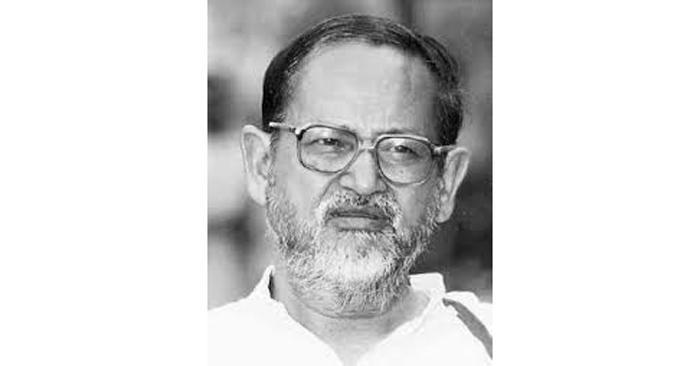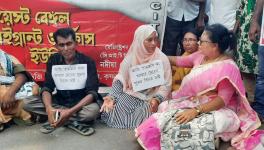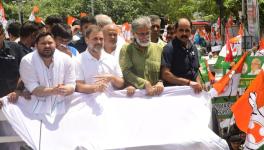AK Roy: An Icon Passes but His Legacy Lives On

21st July brought a big shocker to Indian politics and the Indian left in particular. The veteran communist leader Arun Kumar Roy, Rai Da among the masses of Jharkhand, had passed away. Rai Da is remembered by millions as one who fought full-throttle for the rights of the people of Jharkhand.
AK Roy breathed his last in Dhanbad’s Central Hospital due to multiple organ failure. In his youth, Roy was extraordinary simple. He never had cash in hand. When his health deteriorated, his comrade S Gorai, a party worker in Noonodih, took care of him.
The current political situation following the general elections of 2019, in which the Indian left representation in Parliament has fallen, makes the demise of AK Roy an even more irreparable loss.
Born on 15 June, 1935 in Sapura, a village in Rajshahi district of the former East Bengal to Shibesh Chandra and Renuka, Roy studied chemistry in Calcutta University until 1959 and then worked for two years in a private company. Then he joined Projects and Development India Limited (PDIL) a constituent of Food Corporation of India (FCI) at Sindri in 1961 as a research engineer.
In the exploitation of workers that he witnessed there, and the perpetual fights between management and workers over salaries, he stood in favour of the working class.
He actively participated in the Bihar bandh agitation of 1966. He constantly opposed the government of the day, PDIL’s management and, finally, resigned to formally join politics. He became a full-time member of the Communist Party of India (Marxist) or CPM, actively involved in labour movements.
Roy floated the Bihar Colliery Kamgar Union (BCKU), affiliated to the Centre of Indian Trade Unions (CITU), the labour wing of the CPM. His involvement in the labour movement in Sindri and Dhanbad coal belts in the then undivided Bihar made him popular among workers.
Over time, Roy became a prominent figure in Jharkhand’s koylanchal or coal belt politics. For more than four and a half decades, he raised people’s issues and for a lifetime he maintained the living standard of a common man. The coal fields of Dhanbad in eastern India were a hotbed of coal mafias but that did not deter him.
He became the Sindri MLA for the first time on a CPM ticket in 1967 and attained two more victories consecutively while contesting on the ticket of the Janwadi Kissan Sangram Samiti, an outfit that he had founded. After the 1967s Naxalbari movement in West Bengal, he wrote an article that had not gone down well with the party, leading to his expulsion in 1969.
Thereafter, Roy floated the Marxist Communist Centre (MCC) and represented the Dhanbad Lok Sabha constituency thrice, in 1977, 1980 and 1989. His slogan during the Emergency, “Meri rai, aapki rai, sabki rai—AK Rai” brought him to victory in the 1977 general election. He had received offers to contest on the Janata Dal ticket headed by Jayaprakash Narayan but Roy remained victorious under the red flag.
AK Roy’s life as a communist was an exceptional. He played a role in the amalgamation of principles, that is, the Red and Green, which each stand for the rights of the labourers and the tribals of Jharkhand, who had been fighting for a separate state since the 1970s.
With Jharkhand Mukti Morcha (JMM) supremo Shibu Soren and former Member of Parliament Binod Bihari Mahto, Roy started the Jharkhand movement for statehood from Bihar in 1971. His understanding of the functionality of leftist ideology under democracy stressed openly on interlocking class and caste. Henceforth, this formed the bedrock of the Jhakhand movement. He was equivocal on tribal rights and his slogan for this period was: “Vote se nahi, chot se lengey Jharkhand”. That is, we shall take Jharkhand not through the vote but through blows.
Roy believed that tribals were innately communist in their outlook, as they had a legacy to fight against oppressive regimes, imperialism and capitalists. He, thus, was as a bridge between the left movements and the aspirations of tribals.
In Yojna aur Kranti, Jharkhand se Lal Khand and Birsa to Lenin, New Dalit Revolution, Roy’s role as the link between these movements and aspirations is brought forth.
“He was both mass leader and thinker who belongs in the league of stalwarts of the freedom movement and independent India, from Shaheed Bhagat Singh to MK Gandhi, BR Ambedkar and EMS Namboodiripad,” says Sandeep Chatterjee who teaches at Satyawati College, Delhi University.
Jai Bhim and Lal Salaam was first laid out as a practice by AK Roy during the Jharkhand movement. His write ups and columns in newspaper brought coal belt politics into the national discourse.
Roy is unmatched in terms of his simplicity and stern commitment to ideology. He was the first MP in Indian politics to oppose the Members of Parliament Salaries and Pension Bill, introduced in the Lok Sabha in 1991, which had proposed pay and perquisite hikes for the parliamentarians. TO Roy, the Bill represented a violation of the purpose of serving society.
His own pension used to be deposited in the President’s fund and he had no assets or liabilities—this is well known for he declared this in his nomination papers. He lived in a party office without electricity, travelled only in general class compartments in trains and used no government facility. He did not own a house, car, land, bank account or even a bicycle.
Once, he was accosted by robbers and told them: “Perhaps they were more needy.”
AK Roy is no more but he will resonate among the millions who thrived under his guardianship. His understanding and decisions on peoples’ issues and his ‘Indianisation’ of communist principles. That is his legacy for the mainstream left parties.
While living in Dhanbad, Saurav Kumar observed AK Roy’s politics closely.
Get the latest reports & analysis with people's perspective on Protests, movements & deep analytical videos, discussions of the current affairs in your Telegram app. Subscribe to NewsClick's Telegram channel & get Real-Time updates on stories, as they get published on our website.
























